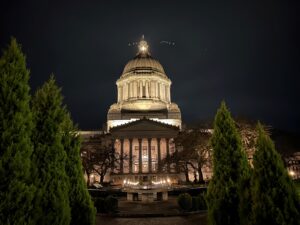 A calm evening at the Capitol (on the outside, at least!)
A calm evening at the Capitol (on the outside, at least!)
(Photo Credit: Erica Hallock)
Trivia
How many Black legislators have served, and are currently serving, in the Washington State Legislature?
Highlights of Week
We’ve passed another cutoff! After a marathon four days of public hearings and executive sessions, the Legislature hit the House of Origin fiscal committee cutoff this past Monday. Bills that did not pass out of fiscal committees are considered “dormant” and not eligible for further consideration, unless deemed “Necessary to Implement the Budget” by legislative leadership.
For advocates, it was a rollercoaster weekend as email inboxes pinged with updates of bills getting scheduled (exhilaration) and, sometimes, bills removed from calendars (despair). In a small number of cases, bills were scheduled for a vote in time for the Monday deadline only to have the Chair announce at the hearing that they were withdrawn from consideration (the depths of heartbreak).
As one example of the volume of work, the Senate Ways and Means Committee agenda had 82 bills on its executive session calendar this past Monday and the House Appropriations Committee had 52.
Attention turns to Floor action. There is little to no downtime in a short session of a part-time Legislature. Starting Tuesday morning, attention shifted to the Senate and House chambers where lawmakers began the process of debating and voting on bills in advance of the Feb. 13 House of Origin cutoff.
I have mentioned the “filter” process built into our legislative system and a very important step in this process happens prior to Floor debate and consideration. The Senate and House Rules Committees consider the bills passed by the policy and fiscal committees and decide which bills advance to their respective Floors. Unlike other committees, these meetings are not scheduled at regular times. One Rules Committee notice this week stated that the meeting would commence “20 minutes after going at ease for lunch.” Prior to the pandemic, these Rules committee meetings were not covered by TVW, but now they are available.
To get to the Floor for debate and vote, a bill must first be “pulled” from the Rules Committee. There are various ways this occurs, and the Senate and the House have variations in their processes. In most Rules Committee meetings, there are “leadership” or “package” pulls where a list of bills is presented for consideration for an up or down vote. There are also “consent” pulls where bills with minimal opposition are listed together and voted on at once. Finally, there are “individual” pulls where each Rules Committee member is assigned a certain number of “pulls” per meeting (e.g., each Rules Committee member is allowed to suggest one bill to advance to the Floor and the Rules members vote to approve that recommendation). Despite the various opportunities for bills to be “pulled” from Rules, not all bills will advance from Rules to the Floor and advocates get more nervous as the week goes on and their bills remain in Rules.
 Here’s to hoping for only affirming and positive messages during the stressful period of Floor activity.
Here’s to hoping for only affirming and positive messages during the stressful period of Floor activity.
(Photo Credit: Molly Champion, image modified by Jess Galvez)
Stayin Alive, Stayin Alive …
The list of active early learning related legislation is much smaller at this stage in the process—post the initial policy and fiscal cutoffs. Be sure to check out our bill tracker on our policy resources page for more detail, but below is a quick look at the bills still moving their way through:
House Bills
- SHB 1945 (Alvarado) Makes children eligible for ECEAP and Early ECEAP if they receive Basic Food benefits and simplifies income eligibility for Working Connections Child Care (WCCC)
- HB 2111 (Nance) Makes technical changes to the WCCC statute
- SHB 2124 (Eslick) Changes WCCC work requirements to allow for family participation in Early ECEAP or Early Head Start and allows WCCC eligibility for ECEAP/Early ECEAP employees if their household income is below 85% of the state median income
- SHB 2195 (Callan) Modifies eligible uses of the Ruth LeCocq Kagi early learning facilities development account (ELF)
- SHB 2322 (Senn) Directs the Office of Financial Management to study existing employer-provided child care programs and provide recommendations for how to expand child care options through businesses
- 2SHB 2447 (Senn) Changes the removal standard for children regarding out-of-home placement due to the use or possession of a high potency synthetic opioid and provides targeted, voluntary home visiting and child care slots and other supports for families
Senate Bills
- SSB 5774 (Billig) Requires the Department of Children, Youth and Families to have the ability to conduct timely fingerprint background checks in its early learning and child care offices
- SB 5941 (Wilson, C.) Makes technical changes to the WCCC statutes
- SSB 6038 (Wilson, C.) Waives child care licensing fees and expands the child care business and occupations tax child care exemption
- 2SSB 6109 (Wilson, C.) Changes the removal standard for children regarding out-of-home placement due to the use or possession of a high potency synthetic opioid and provides targeted, voluntary home visiting and child care slots and other supports for families
What’s on Deck for Next Week?
It’s all about the money, money, money. On Valentine’s Day, the new State Economist Dave Reich is set to present his first Revenue Forecast to the Economic and Revenue Forecast Council. This revenue projection will be used to finalize the 2024-25 Supplemental Budget. It is important to remember that Washington state requires a balanced four-year budget, so budget writers will also be considering out-year impacts of their investments and out-year revenue outlooks.
We expect to see the Senate and House operating, capital and transportation (remember our state adopts THREE budgets) shortly after the revenue report. In fact, the Senate Ways and Means Committee has a Feb. 15 public hearing scheduled to receive comments on its proposed Supplemental Capital Budget, so we can presume their proposed Capital budget will be released sometime that day.
The last few weeks of the legislative session move very fast.
Late nights and weekend work ahead. While most Washingtonians will be preparing their favorite appetizers for Sunday’s Usher concert and viewing of expensive commercials, those involved with the legislative process could be engaged in Sunday Floor activity in advance of the Tuesday, Feb. 13 House of Origin cutoff (the House of Representatives does have a 1 p.m. hold for possible caucus and session). Most likely, though, after a lot of late nights, there may be a break on Sunday so folks can find out if a certain someone was able to arrive from Japan in time for the big game.
In all seriousness, the periods of Floor activity are incredibly intense, with a lot of late nights. Sometimes when I am on my early morning walks, the lights in the Legislative Building are still on, indicating one chamber has pulled an all-nighter and is still deliberating. Tempers get short and bills that had been on a smooth glide could get held up for no apparent reason.
One of the traditions during floor cutoff is identification of the “5 p.m. bill.” Often the 5 p.m. bill is a controversial or consequential bill because if debate starts before the 5 p.m. deadline, it can go on as long as it takes. Occasionally, the final bill can be a “nothing burger,” but more often than not, it is one of greater consequence and there will be murmuring about what the 5 p.m. bill will be in both chambers. We will report back next week.
Groundhog Day? Immediately after the Feb. 13 House of Origin cutoff, we will dive right back into policy committee work. This time, policy committees in the opposite chamber will review the bills still alive in the process passed by the opposing chamber. This is a very compressed timeline with only six days of policy committee hearings and a Feb. 21 opposite house policy committee cutoff. I mentioned last week one of the benefits of introducing companion bills is socializing a concept in the opposite chamber. This benefit becomes clear in these tight time periods.
Bill Tracker
Our bill tracker is updated each Thursday and linked on our policy resources page. Because bills move quickly, the tracker may not have the most recent updates, but this information can be found on the legislative website.

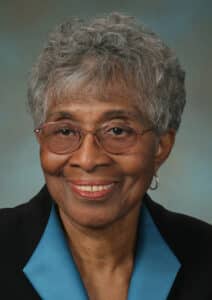 Senator Rosa Franklin, 2009
Senator Rosa Franklin, 2009 The Tivoli Fountain Replica is showing off on a sunny Tuesday (the original Tivoli Fountain is in Copenhagen!)
The Tivoli Fountain Replica is showing off on a sunny Tuesday (the original Tivoli Fountain is in Copenhagen!) The sun shines on Nike and her entourage
The sun shines on Nike and her entourage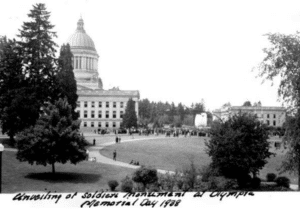 Postcard of “Winged Victory” Unveiling: 1938
Postcard of “Winged Victory” Unveiling: 1938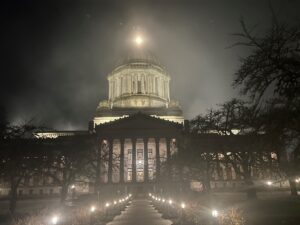 A foggy and misty start to week three
A foggy and misty start to week three Many of the buildings around the Capitol (including the Insurance Building pictured above) are built using Tenino sandstone, our potential future state rock!
Many of the buildings around the Capitol (including the Insurance Building pictured above) are built using Tenino sandstone, our potential future state rock! Former Tenino Stone Company Quarry
Former Tenino Stone Company Quarry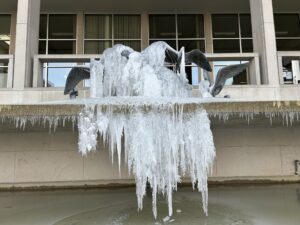
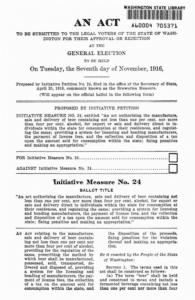 Source:
Source:  A beautiful Monday night outside the Senate John A. Cherberg building
A beautiful Monday night outside the Senate John A. Cherberg building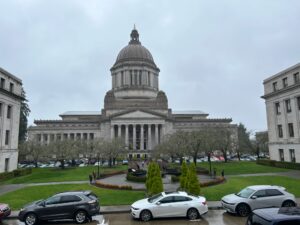 A rainy and stormy opening day to the 2024 legislative session
A rainy and stormy opening day to the 2024 legislative session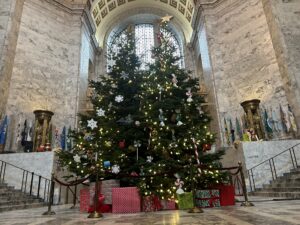 The Legislative Building showing off its winter festive self with the Holiday Tree display. The trees hold 7,000 lights with the theme of “video games.”
The Legislative Building showing off its winter festive self with the Holiday Tree display. The trees hold 7,000 lights with the theme of “video games.” (Photo Credit: Erica Hallock)
(Photo Credit: Erica Hallock)